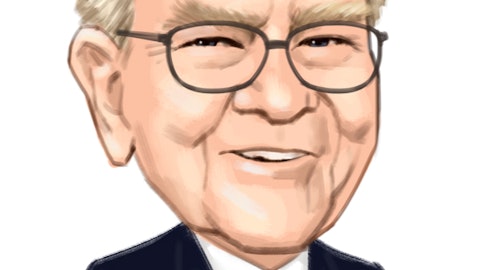In this article, we list down 12 of the best health insurance stocks to buy. If you want to skip our detailed analysis of the healthcare industry and its developments, go ahead and click on the 5 Best Health Insurance Stocks to Buy.
Amidst a backdrop of economic uncertainty worldwide, the healthcare industry has shown impressive resilience. Over time, the demand for healthcare goods and services has proven to be relatively stable. This resilience of the healthcare sector was particularly evident during the equity downturn of 2022, where, for example, the Health Care Select Sector SPDR Fund greatly outperformed the Nasdaq, S&P 500, and Dow Jones. BlackRock, Inc. (NYSE:BLK)’s data indicates that healthcare stocks exhibited 23% less volatility compared to the overall market in the past year. Additionally, throughout the last seven recessions, the healthcare sector consistently outperformed the broader market by an average margin of 10%. Moreover, during the past six recessions, the industry experienced an average earnings growth of 21%.
The healthcare sector stands as a robust sanctuary during economic downturns, given that personal well-being is a non-negotiable priority for most individuals, irrespective of financial constraints. The demand for healthcare remains steadfast, evidenced by the fact that as of 2023, one in three adults globally grapple with chronic conditions such as heart disease, cancer, and diabetes. Concurrently, approximately one in four individuals is projected to encounter a form of mental health disorder during their lifetime. Deloitte, in this regard, estimates an economic loss of $16.3 trillion over a 20-year period due to mental health issues, underscoring the significant impact on the global economy.
Rising healthcare expenses in the nation have rendered it nearly impossible to bear the costs independently, highlighting the vital role of health insurance. In 2021, private health insurance accounted for a substantial portion of the $4.26 trillion spent on healthcare, surpassing Medicare and Medicaid, with a coverage worth $1.21 trillion. Out-of-pocket payments for healthcare amounted to just $433 billion. Across the board, over 300 million Americans had some degree of health insurance coverage in 2022, marking a 40% rise since 1990. As of 2023, the US health insurance exchanges, established under the Affordable Care Act in 2014, are celebrating their tenth year of operation. Over this decade, the individual market has remained dynamic, witnessing shifts in insurer involvement, pricing, and plan offerings on an annual basis. Global research and consultancy firm McKinsey states that consumer engagement notably surged by 25% between 2020 and 2022, reaching around 16 million participants. This increase aligned with the elongated enrollment periods and improved subsidies introduced by the American Rescue Plan Act of 2021, later prolonged through 2025 by the Inflation Reduction Act of 2022.
The global health insurance industry stands to experience substantial growth in the future. Projections indicate that the global health insurance market is anticipated to achieve a Compound Annual Growth Rate (CAGR) of 9.9% from 2022 to 2030, as outlined by Straits Research. By 2030, this growth is expected to propel the market to a value of $5.28 trillion. In that same vein, some of the best health insurance stocks in the industry include UnitedHealth Group Incorporated (NYSE:UNH), CVS Health Corporation (NYSE:CVS), and Elevance Health, Inc. (NYSE:ELV), among others listed below.

Photo by martha-dominguez-de-gouveia on Unsplash
Our Methodology
To compile our list of the best health insurance stocks to buy, we scoured through Insider Monkey’s Q2 2023 database to identify the leaders in the health insurance industry based on hedge fund sentiment. The following companies, ranked according to the number of hedge funds that hold their shares, all offer health insurance services within the United States, and/or internationally.
12. Globe Life Inc. (NYSE:GL)
Number of Hedge Fund Holders: 29
Globe Life Inc. (NYSE:GL) is a financial services company headquartered in Texas, offering a range of insurance coverage options. The company specializes in supplemental health insurance products, including cancer insurance, ICU insurance, critical illness coverage, and hospital insurance. Notably, Globe Life Inc. (NYSE:GL) provides Medicare supplemental insurance plans that assist in covering expenses like deductibles, co-insurance, co-payments, and cost-sharing for outpatient hospital services.
In a bid to expand its healthcare business, Globe Life Inc. (NYSE:GL) completed its acquisition of Evry Health, a business-to-business health insurance company based in Dallas, Texas, on October 16.
Cumulatively, 29 of the 910 hedge funds part of Insider Monkey’s Q2 2023 database had invested in Globe Life Inc. (NYSE:GL), up from 24 in the previous quarter.
Much like UnitedHealth Group Incorporated (NYSE:UNH), CVS Health Corporation (NYSE:CVS), and Elevance Health, Inc. (NYSE:ELV), Globe Life Inc. (NYSE:GL) ranks as one of the best health insurance stocks to invest in.
11. Molina Healthcare, Inc. (NYSE:MOH)
Number of Hedge Fund Holders: 38
Molina Healthcare, Inc. (NYSE:MOH) is a managed care company based in Long Beach, California, United States. The company offers health insurance to individuals through government programs like Medicaid and Medicare.
Molina Healthcare, Inc. (NYSE:MOH) announced its GAAP earnings per diluted share of $5.35 and adjusted earnings per diluted share of $5.65 for the second quarter of 2023. As of June 30, 2023, and factoring in the early effects of Medicaid redeterminations, the company catered to about 5.2 million members.
In Q2 2023, Molina Healthcare, Inc. (NYSE:MOH)’s shares were held by 38 hedge funds in Q1, compared to 41 funds in the previous quarter. These were valued at $711.9 million. With a stake valued at $427.7 million, Henry Ellenbogen’s Durable Capital Partners was the company’s largest shareholder for the quarter.
Scout Investments mentioned Molina Healthcare, Inc. (NYSE:MOH) in its third-quarter 2022 investor letter. Here is what it said:
“Molina Healthcare, Inc. (NYSE:MOH) also performed well as sentiment toward health maintenance organizations improved, both as a relatively defensive investment during uncertain times, and as the bear case on the stock was partially debunked with an extension of expanded enrollment for government health insurance programs.”
10. MetLife, Inc. (NYSE:MET)
Number of Hedge Fund Holders: 40
The Metropolitan Life Insurance Company, better known as MetLife Inc. (NYSE:MET), is among the largest global providers of insurance, annuities, and employee benefit programs, with more than 90 million customers in over 60 countries.
On October 10, MetLife Inc. (NYSE:MET) declared a $0.52 per share quarterly dividend, the same as the previous dividend amount, which will be distributed to shareholders on December 14, of record on November 9. The company’s dividend yield on October 16 stood at 3.28%.
As of Q2 2023, 40 hedge funds were long MetLife, Inc. (NYSE:MET) with collective stakes of $1.17 billion in the insurance giant. Richard S. Pzena’s Pzena Investment Management is MetLife, Inc. (NYSE:MET)’s largest investor, owning a $261.9 million stake through 4.63 million shares.
9. Chubb Limited (NYSE:CB)
Number of Hedge Fund Holders: 50
Chubb Limited (NYSE: CB) is a multinational insurance corporation providing a diverse array of insurance and reinsurance offerings to individuals, businesses, and various entities worldwide. On August 10, the company announced a quarterly dividend of $0.86 per share, maintaining its consistent dividend track record. The company has steadily increased its dividends for the past three decades. As of October 16, the stock boasts a dividend yield of 1.61%.
Insider Monkey’s database of Q2 2023 indicated that 50 funds owned stakes in Chubb Limited (NYSE:CB) in Q2 2023, growing from 45 in the previous quarter. The consolidated value of these stakes is over $1.73 billion. With over 1.5 million shares, Millennium Management was the company’s leading stakeholder in Q2.
8. Centene Corporation (NYSE:CNC)
Number of Hedge Fund Holders: 57
Centene Corporation (NYSE:CNC), headquartered in St. Louis, Missouri, is a publicly traded managed care firm serving as an intermediary for both government-sponsored and privately insured healthcare programs. The company primarily focuses on the Medicaid market, with a significant proportion of its membership consisting of traditional participants, including those in programs like Children’s Health Insurance Program and Temporary Assistance for Needy Families, who require regular monitoring. Medicaid plans account for nearly two-thirds of Centene Corporation (NYSE:CNC)’s total revenue, making it a vital revenue stream. However, the company is experiencing even faster revenue growth in its Medicare segment.
On July 28, Centene Corporation (NYSE:CNC) revealed its Q2 non-GAAP earnings per share of $2.10 and reported a revenue of $37.61 billion. The revenue surpassed market estimates by $1.07 billion, demonstrating robust performance, and the earnings outperformed Street expectations by $0.05.
According to Insider Monkey’s second quarter database, 57 hedge funds were bullish on Centene Corporation (NYSE:CNC). This number was 61 in the previous quarter. Quentin Koffey’s Politan Capital had the largest position in the stock, with 12.13 million shares worth $818.65 million.
Oakmark Funds made the following comment about Centene Corporation (NYSE:CNC) in its Q3 2023 investor letter:
“Centene Corporation (NYSE:CNC) is one of the largest health insurers in the U.S. The company specializes in three major government-sponsored programs: Medicaid, Marketplace and Medicare Advantage. Each of these benefits from long-term secular tailwinds. In Medicaid, states are steadily outsourcing their programs to managed care companies, like Centene, as it helps states reduce costs and improve care quality. Indeed, Managed Medicaid penetration has increased from 25% of total Medicaid spend in 2010 to 60% today, and we expect further gains over time. In Marketplace, growth is driven by the trend toward more individuals buying health insurance. Centene holds the #1 market share in both of these programs and is well positioned to capitalize on their continued growth. The stock trades for 10x consensus 2024 EPS, but this doesn’t tell the whole story. Past missteps in Centene’s Medicare business will result in that segment losing $0.80 per share next year. We believe Centene can turn Medicare around and generate positive earnings in the next few years. This could increase EPS by more than $1 per share and reduce the P/E ratio to just 8.5x. We think that’s good value for a business that generates healthy returns on capital and is capable of growing EPS at a low double-digit rate.”
7. The Progressive Corporation (NYSE:PGR)
Number of Hedge Fund Holders: 69
The Progressive Corporation (NYSE:PGR) is a prominent American insurance company that offers automobile and health insurance solutions. By the latter part of 2022, Progressive had achieved the status of being the largest motor insurance carrier in the United States. The company’s origins trace back to 1937 when it was co-founded by Jack Green and Joseph M. Lewis. Its headquarters are located in Mayfield Village, Ohio.
During July of 2023, The Progressive Corporation (NYSE:PGR) experienced a stock price surge after J.P. Morgan analyst Jimmy Bhullar upgraded the rating from Neutral to Overweight. This upgrade happened despite The Progressive Corporation (NYSE:PGR) reporting recent disappointing financial results. Bhullar emphasized that despite subpar margins over the past two years, he holds an optimistic long-term outlook for the personal auto market, considering it a structurally superior business compared to commercial lines or reinsurance.
As of the end of the first quarter of 2023, 64 hedge funds tracked by Insider Monkey were long The Progressive Corporation (NYSE:PGR).
The London Company Large Cap Strategy made the following comment about The Progressive Corporation (NYSE:PGR) in its second quarter 2023 investor letter:
“The Progressive Corporation (NYSE:PGR) – PGR underperformed during Q2 due to concerns about additional price hikes needed to maintain its targeted profitability ratio. PGR continues to increase auto policies in force, but recent costs were higher than expected. To combat weaker than expected margins, PGR is reducing advertising spending and increasing prices on insurance. Looking ahead, we believe PGR remains well positioned reflecting its more flexible pricing platform and tech solutions that monitor and price for distracted driving. While near-term costs were higher than expected, PGR has a great track record of profitability and conservative underwriting philosophy.”
6. Humana Inc. (NYSE:HUM)
Number of Hedge Fund Holders: 70
Humana Inc. (NYSE:HUM) is a company focused on health and well-being, providing healthcare benefits to medical and specialty members. The range of services includes fully-insured medical and specialty health insurance benefits such as vision, dental, supplemental health benefits, and administrative services only (ASO products) for individuals and employer groups. The company also offers healthcare services catering to retired and active duty military personnel and their dependents. These services encompass pharmacy solutions, clinical care services, provider services, as well as predictive modeling and informatics services.
On August 8, after an as-expected quarter and an upward revision in guidance, Bernstein chose to increase its price target for Humana Inc. (NYSE:HUM) from $568 per share to $599 per share. This adjustment highlights Bernstein’s optimistic reevaluation of Humana Inc.’s potential stock value, indicating a more positive outlook for the company’s market performance. While raising the price target, Bernstein retains its “Market Perform” rating.
By the end of this year’s second quarter, 70 among the 910 hedge funds part of Insider Monkey’s research had bought Humana Inc. (NYSE:HUM)’s shares. Rajiv Jain’s GQG Partners is its biggest stakeholder since it owns $1.3 billion worth of shares.
Vltava Fund made the following comment about Humana Inc. (NYSE:HUM) in its Q3 2023 investor letter:
“A new position in the portfolio is the US health insurer Elevance Health. This sector is quite familiar to us. In fact, we also have shares of another health insurer, Humana Inc. (NYSE:HUM), in our portfolio, which we first bought in 2009. The sector has been very attractive over the long term and its structure favours big players, which both Humana and Elevance Health are. Because each of these two companies also has some specific risk, we decided to increase our investment in the sector by acquiring this second position. Both companies are high-growth in terms of profitability and we expect their above-average growth to continue for quite some time.”
Humana Inc. (NYSE:HUM) joins the ranks of UnitedHealth Group Incorporated (NYSE:UNH), CVS Health Corporation (NYSE:CVS), and Elevance Health, Inc. (NYSE:ELV) as one of the best health insurance stocks investors should keep on their radars.
Click to continue reading and see 5 Best Health Insurance Stocks to Buy.
Suggested articles:
- 12 Best Upwork Alternatives for Freelancers and Employers
- Top 20 Countries With Most Natural Resources in the World
- 23 High-Paying Trade and Vocational Jobs in 2023
Disclosure: None. 12 Best Health Insurance Stocks to Buy is originally published on Insider Monkey.




